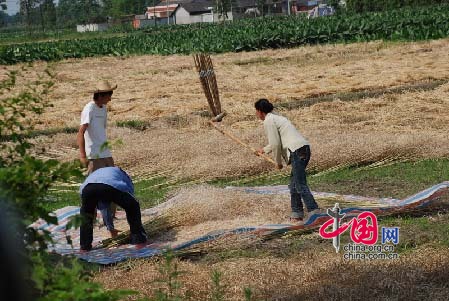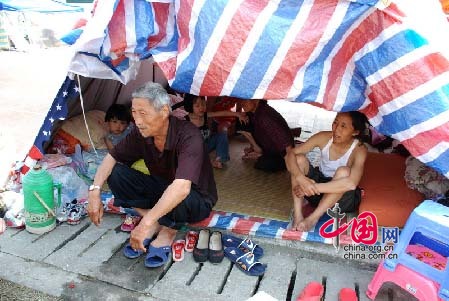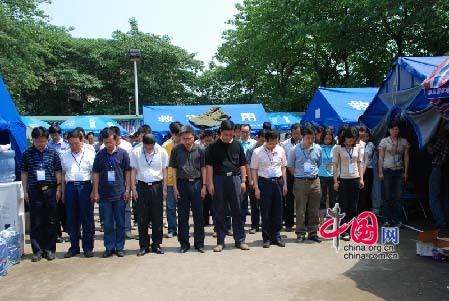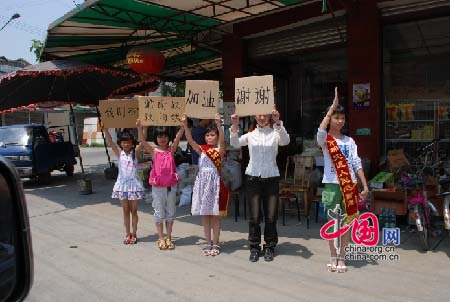By David Ferguson
China.org.cn correspondent reporting from Sichuan

Life goes on – Peasants flail rape-seed in the fields.
Preparing to leave for Sichuan, I feel like I am being sent into a war zone. I am issued with a bag of medicines the size of a small suitcase.
"Stick together at all times", we are told. "Safety is your number one priority."
Arriving in Chengdu, the capital of Sichuan, the sense of unreality continues. Only 90 km from the epicenter of the quake, the primary impression is one of normality. Throughout the city, people go about their daily business. Restaurants and shops are open and full. Buildings are undamaged.
There is nothing at all to indicate the catastrophic losses that have occurred in the nearby mountains. Well, almost nothing. Every so often you can see a tent pitched or a tarpaulin stretched on a patch of open ground, a sign of a resident putting caution before comfort.
Chengdu must be like one of those French towns in the First World War, a similar distance from the swathe of trench horror that cut the length of the country.?Ninety km from the front line, life there must have proceeded much as normal.

Patience in adversity – goods lost, but all lives safe
Traveling north-west from Chengdu towards the earthquake epicenter, that sense of normality continues. The fields are full of crops, and farmers?are at work. It is the time for planting rice and for harvesting rape seed. Everywhere, flails pound the rape bushes, separating the grains from the winter fuel. Bright green carpets of tobacco provide a blaze of color. A man fishes peacefully on the grassy banks of the?Yangtze River.
At Shifang City Relief Camp the facade breaks. Outside the camp, there is a montage of photos of the earthquake and its aftermath. An anthology of suffering.
Some of the photos are graphic in their brutality. One shows the bodies of two young men, suspended from the upper floors of a collapsed building. Their limbs and torsos undamaged, they hang by heads and shoulders crushed under falling masonry.
Inside the camp, hundreds of makeshift tents. Fortunately, there is no shortage of emergency tenting material. Every farm would have its supply of polytarps, normally spread along the sides of the roads at this time of the year for drying grains and seeds. Now the crops lie on the bare ground, and the tarpaulins have been pressed into a different service.
We speak to a farming family who have lost their home – one old man, two younger women, an adolescent boy and two toddler girls. They lost everything in the quake, but they all escaped. Three families are sharing their tent, ten people in all.
They walked on foot in the rain to reach the camp. The old man shows us his blisters. When they arrived, the authorities were hard-pressed, they tell us. So they built their shelter themselves. Now one of the men has gone back to their home to see if he can retrieve anything that might be of use.
It has rained heavily in the past week, but today is hot and dry. Listless and uncomfortable in the heat, people lie in their tents listening to a loud tannoy broadcasting radio coverage. There isn't a great deal more for them to do.
Shifang City Communications and Public Relations Director Gao Feng is in charge. He speaks rapidly and articulately about the situation. Now there are over 4,000 people in the camp. More are arriving each day as the rescue squads penetrate further into the worst-hit areas. He doesn't yet know how long people will be obliged to stay there, and he's not sure what provision will be made for longer-term accommodation. Some of them, he knows, will simply make their way back to their homes and start to rebuild.
The administrative service workers appear busy and efficient. At the counseling tent three young teenagers are talking to the staff. They look upset. It turns out that they are not residents, but young people from the city who have volunteered to help. Not all their efforts are appreciated, and they are hurt.

The Shifang Camp Counselors bow their heads in respect.??
"Don't think of yourselves", says the counselor. "Remember why you came here. Focus on the work you have to do."
China has declared May 19 to be the first of a series of days of national mourning, the first since the death of Mao. At 2.28 PM, the time when the earthquake struck, everything will come to a stop for one minute’s commemoration.
It will be a time not only to remember those who died in the earthquake itself, but for all its other victims.
For people like brave 16-year old Yang Liu, who lay for sixty hours with her legs trapped in the rubble, the body of a dead classmate beside her. In the end, rescuers had to amputate her legs to free her, but she will live.

We will pull through!
For people like brave Wang Gang, 42, the deputy director of public security at the Wolong Panda Reserve. Seeing a woman who had strayed under the path of a helicopter that has started dropping emergency supplies, he threw himself at her to save her life, and paid for his courage with his own.
For a death toll that will continue to rise in the days to come. Not only the ones who still lie buried in the rubble – surely there cannot be any now left alive – but also for those who will lose their lives trying to bring help or rescue to the stricken. Only yesterday, we heard that over 200 road-builders have been buried in the past few days by mud and landslides as they try to restore and to keep open the roads that bring relief.
For all of these, and tens of thousands more, the siren sounded at 2.28 PM yesterday, and along with the rest of the country Shifang Relief Camp came to a standstill. The camp counselors stood in a respectful line, their head bowed. Cars stopped in the streets, but they sounded their horns in a gesture of solidarity to let the suffering know that they are not forgotten.
Behind me, I could hear a teenage boy crying quietly. I did not turn to look at him, but left him in peace to his own thoughts.
The spirit of the day was captured by a group of five young girls standing quietly by the roadside in Majing Town, saluting passing motorists. "Thank you all", said their penciled cardboard signs. "We will pull through. Your help will dry our tears."
(China.org.cn May 20, 2008)